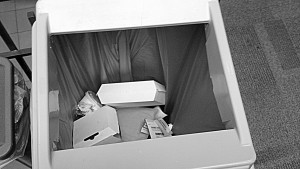 I think about disposability a lot, about how we use a thing for a single purpose, for a moment in time, and then it is no longer any good to us.
I think about disposability a lot, about how we use a thing for a single purpose, for a moment in time, and then it is no longer any good to us.
Plastic water bottles, grocery bags, a cardboard to-go container in the Caf. Every second, the United States throws away 1,500 plastic water bottles. Every minute, that is 90,000 bottles. In a hour, we throw away 5,400,000 bottles of water, and every day that number jumps to 129,600,000.
I have often talked to friends and family about the perpetual grocery bag problem, where people have the reusable grocery bags, but they seem to just always forget them. My question is: what is it going to take for us to remember?
At the Caf and Courtyard Café, you get a “green discount” for bringing your own mug. I believe the discount is 15 cents. This same discount does not extend to the use of the free reusable mugs they have upon request. But on those days when your alarm doesn’t go off, your socks don’t match, and you are running late for class, is 15 cents really worth it? Is it worth taking the time to remember and wash your mug and bring it with you for coffee?
For many people, the answer is no. Is that harsh? Or is it just honest? The problem is that disposability is the standard in most of our lives. We are expected to throw things away. What do you think the effect would be if instead of offering an incentive discount to bring your own mug, there was a charge for the use of a disposable cup? If, instead of a discount for being green, we were charged for our waste?
A lot of people will justify their waste by recycling. I want to start off by saying that recycling is a wonderful thing and we should do more of it, but recycling should not be our first mode of defense against pollution.

The three Rs are reduce, reuse, and recycle. Recycling is actually last in the list of things that we should do, it is a kind of last resort in the effort to reduce waste. Instead of producing waste and then recycling it, we should try to reduce how much waste we create in the first place, and try to reuse as much as possible.
There are a lot of opportunities to reduce and reuse at Gustavus. Instead of using a cardboard to-go container in the Caf for your food, use GustieWare. If there isn’t any GustieWare (it happens), consider just using a plate and carrying your food. If you want a Coke to bring to class, fill up a glass and carry it to class rather than buying a bottle. If you are worried about spilling, use a larger glass or use a compostable lid. Throwing away a single lid is better than throwing away a whole bottle.
I sometimes wonder what the world would look like if we threw everything away. What if instead of doing laundry we just threw away our clothes? Socks are not expensive, why do people take the time to wash them?
It seems as though the reason why we throw so much away is because it seems normal to do so. When we throw stuff away, we have to buy it again, which businesses love. This is why there is so much advertising done to support waste, to convince people that old is bad, new is good, and you can never get something as clean as something new. I guess advertisers can say whatever they want; the problem is that people buy into it.
We spend so much money buying things that we could make from what we already have or that we just threw away. We are being deceived. We have the creativity to make things that we need.
Instead of throwing that water bottle away, turn it into a pencil case, or a bird feeder, or anything. Just think — the possibilities are endless.